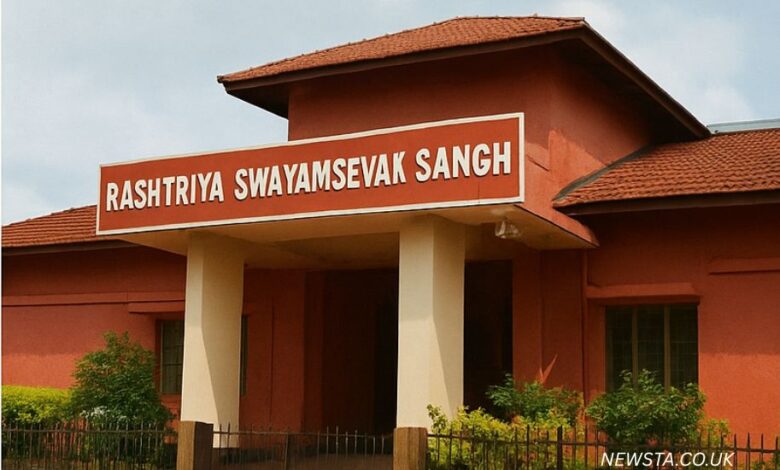RSS Letter No 0876: Exploring the Claims, Context, and Mystery

The phrase “RSS Letter No 0876” has increasingly appeared across blogs, discussion forums, and online articles, sparking debates about its origins, contents, and significance. Many blogs describe it as an internal communication or directive from the Rashtriya Swayamsevak Sangh (RSS), the socio-cultural organization in India often associated with the Bharatiya Janata Party (BJP). Yet, despite its growing popularity online, no primary source document has been publicly verified.
This article takes a deep dive into what is being claimed about RSS Letter No 0876, the themes highlighted in various blog posts, the historical context of RSS communications, and the reasons why this particular “letter” has become both a point of curiosity and suspicion.
The Emergence of RSS Letter No 0876 Online
Around mid-2024, several lesser-known blogs began publishing detailed posts about a supposed “Letter No 0876” attributed to the RSS. Websites like Logsabha, Megabant, and Paperblog offered long-form pieces outlining the alleged themes of the letter — from cultural revival to digital governance and national self-reliance. These posts framed the document as a significant organizational directive that carried ideological and social weight.
However, these articles all seemed to replicate similar wording, tone, and content, raising questions about whether they stemmed from a single original source or were auto-generated for SEO purposes. The absence of a scan, official publication, or direct reference on the official RSS website deepens the ambiguity.
Claimed Themes Within RSS Letter No 0876
Although no verified text of the letter exists in the public domain, online discussions and blog posts attribute several recurring themes to it.
1. Cultural Revival and Heritage
According to these articles, the letter stresses the preservation and promotion of India’s cultural identity. It supposedly encourages volunteers and members to embrace traditional practices, rituals, and philosophies while blending them with modern life. This mirrors the RSS’s long-standing emphasis on fostering national unity through cultural roots.
2. Self-Reliance and Economic Strength
Another consistent theme is aatmanirbharta (self-reliance). The letter allegedly calls for reducing dependency on foreign goods and services while promoting indigenous production. This aligns with broader national campaigns that focus on strengthening local industries and entrepreneurship.
3. Digital Governance and Technology
Several blogs suggest that RSS Letter No 0876 highlights the role of digital transformation. The supposed directives encourage embracing technology, using digital platforms for outreach, and modernizing organizational functions without losing sight of cultural values.
4. Organizational Mobilization
The letter is often described as urging greater volunteerism, youth engagement, and grassroots mobilization. This is consistent with the RSS’s known strategies of community outreach and capacity-building.
The Mystery of Verification
Despite the abundance of commentary, no reputable news outlet or the official RSS portal has published “Letter No. 0876.” The official site of RSS includes speeches, press releases, and publications, but searches yield no trace of such a document.
This lack of verification fuels the suspicion that RSS Letter No 0876 may not exist as an official or authentic communication. It could be a case of misattribution, fabricated content, or even a symbolic placeholder used by blogs to drive traffic.
The Role of Fake or Morphed Letters in Indian Politics
The RSS and affiliated political entities have previously been victims of fake letters and misattributed documents circulated online. Several fact-checking organizations, including Factly, have exposed morphed communications falsely attributed to the RSS. These incidents highlight how fabricated letters are often used to sway public opinion, create confusion, or score political points.
Against this backdrop, the emergence of “RSS Letter No 0876” without credible verification fits a familiar pattern. It underscores the importance of skepticism and cross-checking when encountering viral content online.
Why People Are Curious About RSS Letter No 0876
The mystery has, paradoxically, fueled its popularity. Here’s why people continue to search for it:
- Curiosity about secrecy: When something is said to exist but is unavailable, people naturally want to uncover it.
- Political climate: In India’s politically charged atmosphere, any new RSS directive is perceived as influential on government policies.
- Media amplification: Even without evidence, blogs and social posts amplify the phrase, pushing it higher in search engine rankings.
- Cultural resonance: The themes tied to the letter — nationalism, heritage, technology — resonate strongly with audiences.
Analytical Perspective: If the Letter Were Real
If we assume for the sake of analysis that RSS Letter No 0876 exists in the form described by online blogs, it would represent:
- A blend of tradition and modernity, encouraging both cultural pride and digital adaptability.
- A push for economic sovereignty, in line with government campaigns like “Make in India” and “Digital India.”
- A reinforcement of grassroots mobilization, urging volunteers to actively participate in civic life.
Such themes would not be surprising, given the RSS’s history of issuing ideological guidance to its members and affiliates. But again, this is speculative rather than confirmed fact.
The Importance of Responsible Information Sharing
The case of RSS Letter No 0876 illustrates a larger issue in the digital age: how quickly unverified content can circulate and take on a life of its own. Without primary documentation, every repetition of the claim risks reinforcing misinformation.
Readers and researchers should remember:
- Always check official portals for source documents.
- Look for coverage in established news outlets before accepting claims.
- Be cautious with content that appears on multiple low-credibility blogs with identical wording.
Conclusion
The mystery surrounding RSS Letter No 0876 continues to generate curiosity and speculation. Blogs have painted it as a cultural and political directive, but the lack of any verifiable document on official channels raises doubts about its authenticity. Whether it is a genuine internal communication, a misunderstood reference, or a manufactured piece of content, the phrase underscores the need for careful media literacy.
For now, RSS Letter No 0876 remains more of an online phenomenon than a proven historical or political document. The debates around it remind us to critically assess sources in an era of fast-moving digital narratives.
As a reader, if you want to stay informed about similar topics and deep-dive analyses, make sure to follow Newsta, where we explore emerging stories, their context, and their credibility.
Q1. What is RSS Letter No 0876?
RSS Letter No 0876 is a term that has circulated across blogs and online platforms, often described as an internal communication of the Rashtriya Swayamsevak Sangh. However, no official copy of this letter has been publicly verified.
Q2. Is RSS Letter No 0876 authentic?
As of now, there is no evidence of authenticity. The official RSS website and reliable news outlets have not published such a letter, raising doubts about whether it truly exists.
Q3. What themes are said to be in RSS Letter No 0876?
According to online claims, the letter covers topics like cultural revival, national self-reliance, digital governance, and organizational mobilization.
Q4. Why is RSS Letter No 0876 popular online?
Its popularity stems from curiosity, political interest, and repeated coverage by multiple blogs, despite the lack of verifiable proof of the letter itself.
Q5. Has RSS faced fake letters before?
Yes. Several fake or morphed letters have been attributed to RSS in the past, which were later debunked by fact-checking organizations.
Q6. Where can I find official RSS communications?
Authentic information and publications are available on the official RSS website (rss.org) and through established Indian news outlets.
Thanks for read our article if you want more like this kind of article visit our site Newsta, and comment us. We provide authentic & comprehensive information to our readers.



